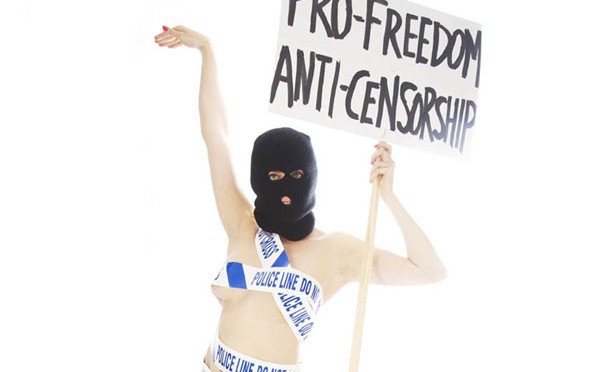We welcome back stripper, activist and blogger Stacey Clare, who reports that Islington council has bravely “rescued” some male strippers from being objectified and exploited in a London venue.
The men of Adonis Cabaret have been saved from a lifetime of exploitation at Club Aquarium!
Last weekend, on Saturday 23rd of September, licensing officials from Islington Council attended a male strip show, which was found to be in breach of local by-laws. The Adonis Cabaret, a “male stripper troupe”, who were resident at a well-know nightclub on Old St. in London for several years, were found to have been exploiting men every weekend, forcing them to flash their genitals for the titillation of hundreds of women.
Men have been earning thousands of pounds from stripping, often using the money to support their steroid and cosmetic surgery addictions. Others have been spending their earnings on lavish lifestyles, posting photos from luxury holidays and expensive shopping trips on social media. One male stripper posed with his mum on a yacht, drinking champagne. It is estimated that male strippers earn on average £2k from gyrating their hips.
During their premises inspection, the licensing officials sat all the way through a two-hour long performance, right up to the very end, in order to catch the ensemble flouting a local licensing regime that forbids full nudity, as they waved their willies in the direction of the audience. Licensing laws were changed in 2009 to protect the public from the spread of an industry that is responsible for modern slavery and human trafficking.
Club Aquarium, famous for it’s indoor swimming pool and late license, may seem like any other conventional venue, but within it’s subterranean walls it hid a dark secret. Just as one would stare at underwater creatures on a trip to SeaWorld, customers at Club Aquarium are encouraged to view men’s bodies as a commodity. There is nothing to alert unsuspecting passers-by to the nature of this seedy underworld; any normal, healthy person on foot would be fooled into thinking it was a regular discotheque. But every Saturday night drunken hoards of women arrived in their hundreds, joining parties of gay men to queue up for their seats at the so-called cabaret.
The Adonis Cabaret website is a lurid display of oiled up flesh, men pose in degrading outfits to be sexually objectified by the female gaze and gays. “The UK’s Hottest Ladies night” is how the men, aged between 18 and 50, are touted online. Their “unbeatable fun party package” includes “free yummy buffet…the sexiest lads…interactive variety acts…Sing-a-long”. Commercial sexual exploitation of men has become as normal as a Karaoke bar or All-You-Can-Eat smorgasbord. On arrival to the venue young frightened looking men with rippling chests provide a meet-and-greet; a chance for the consumers of these so-called “services” to grope and fondle the “entertainers”, all under the guise of taking a selfie.
When the show starts the mood among the audience turns to a more predatory atmosphere. Where the men were earlier viewed as sex-objects, they now become veritable pieces of meat, to whom the women in the rows of seats feel entitled. Men are pushed onstage by a thuggish, so-called drag queen, and are made to perform sexualized dance routines, entirely for the pleasure of the onlookers. The finale of each show, a flash of engorged genitals, is the ultimate form of sexual objectification – a spectator sport for the mostly female viewers of this so-called entertainment.
For the attendees it’s all bit of light-hearted fun right? An excuse to ogle at fit blokes while they appease the audience with a tantalising striptease. But the human cost of this type of entertainment goes largely ignored. New evidence revealed recently found that more than a half a million men, mainly immigrants, are working in the sex industry and in brothels and have been trafficked or coerced in some way or other.
One Eastern European man using the name ‘Mike’ said, in broken English “I was working out in the gym one day, when a nice friendly guy approached me. He said I could get work as a dancer in the UK and earn thousands. He was really nice to me, and I trusted him. He paid for my flights and brought me to the country, it was really like a dream. Next thing I knew I was put in a room with all these massive guys in thongs. Their muscles were bulging. They gave me some fake tan and some porn, and told me to get myself hard; showed me how to use a rubber band as a cock-ring to keep myself erect. Suddenly I was on stage, about a thousand women were screaming and grabbing at me, tearing my clothes off. My life is ruined. Things will never be the same now.”
The normalisation of viewing men as sex objects has had a devastating affect on the locality as women leaving the show have sexually harassed normal, healthy men passing by the club. “I’m too afraid to walk down Old St. now” said one 26 year-old man, who preferred not to be named. “I feel intimidated and fearful at night, it’s like the streets are not safe for me anymore”.
The male strip clubs are a growth industry in the UK, worth an estimated £10bn. However, researchers say that the cost to our so-called economy is probably greater. For now, the men of Adonis Cabaret can breathe a sigh of relief; having been released from their gruelling routine of working one day per week, they now have the freedom to figure out how to pay next months rent by going back to normal lives, working a 60 hour week on minimum wage.

